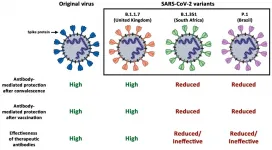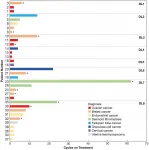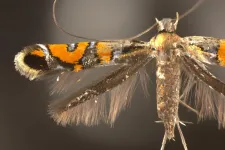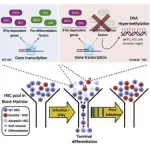Evidence for reduced antibody protection against SARS-CoV-2 variants
Cell culture studies show that mutated viruses are less susceptible to inhibition by antibodies from recovered or vaccinated individuals
2021-03-25
(Press-News.org) Göttingen, March 25, 2021. Testing and vaccination - these are the pillars on which humanity is trying to get a grip on the Coronavirus pandemic. Although it is taking longer than many had expected, it is believed that it is only a matter of time before we are all vaccinated and thus protected. However, time is also working for the virus, which has now mutated several times, with variants B.1.1.7 from the United Kingdom, B.1.351 from South Africa and P.1 from Brazil spreading rapidly. These viruses have mutations in the so-called spike protein, the structure on the surface of the virus that is responsible for attachment to host cells. At the same time, the spike protein is also the major target of the immune response. Antibodies generated in response to SARS-CoV-2 infection or vaccination bind to the spike protein, thereby blocking the virus. A team led by Markus Hoffmann and Stefan Pöhlmann of the German Primate Center - Leibniz Institute for Primate Research and Jan Münch of the Ulm University Medical Centre has found that the SARS-CoV-2 variants B.1.351 and P.1 are no longer inhibited by an antibody used for COVID-19 therapy. In addition, these variants are less efficiently inhibited by antibodies from recovered patients and vaccinated individuals. Thus, convalescence from COVID-19 as well as vaccination may offer only incomplete protection against these mutant viruses (Cell).
SARS-CoV-2 viruses invade lung cells in order to multiply. For the virus to enter a cell, it must first attach to the cell surface. For this, the virus uses its so-called spike protein, which is located on the viral envelope. The spike protein is also the target for therapies and vaccines aimed at preventing the virus from replicating in the body.
At the beginning of the pandemic, SARS-CoV-2 was relatively stable, but recently several viral variants have been detected and are spreading rapidly. Variants B.1.1.7, B.1.351, and P.1, which first appeared in the United Kingdom, South Africa, and Brazil, respectively, have mutations in the spike protein and some are located in areas targeted by currently used antiviral agents and vaccines. "This is worrisome because the rapid spread of variants that might not be efficiently inhibited by antibodies could undermine our current vaccination strategy," says Stefan Pöhlmann, an infection biologist at the German Primate Center in Göttingen. Therefore, the team led by Pöhlmann and Münch investigated how effectively the mutant viruses are inhibited by drugs and antibodies.
"We found that certain antiviral agents that block host cell entry and are in (pre)clinical development inhibit the mutant viruses just as well as the original virus. Variant B1.1.7, which is currently spreading rapidly in Germany, was also efficiently inhibited by antibodies, including antibodies induced by vaccination. In contrast, an antibody used for COVID-19 therapy did not inhibit variants B.1.351 and P.1. Moreover, these variants were less well inhibited by antibodies from convalescent or vaccinated individuals, they partially bypassed the neutralizing effect of the antibodies," says Jan Münch. The use of the currently available vaccines makes sense and a rapid expansion of the vaccination efforts in Germany is desirable. However, it is possible that vaccination or recovery from COVID-19 may offer reduced protection from SARS-CoV-2 variants B.1.351 and P.1." Clinical studies must now show the extent to which this fear is true. "Our findings show that it is important to limit the spread of the virus as much
INFORMATION:
as possible until widespread vaccination is feasible. Otherwise, we risk the emergence of new variants that cannot be effectively controlled by the currently available vaccines" says Markus Hoffmann, first author of the study.
Original publication
Hoffmann, M., Arora, P., Groß, R., Seidel, A., Hörnich, B.F., Hahn, A.S., Krüger, N., Graichen, L., Hofmann-Winkler, H., Kempf, A., Winkler, M.S., Schulz, S., Jäck, H.-M., Jahrsdörfer, B., Schrezenmeier, H., Müller, M., Kleger, A., Münch, J., Pöhlmann, S.: SARS-CoV-2 variants B.1.351 and P.1 escape from neutralizing antibodies, Cell (2021), doi: https://doi.org/10.1016/j.cell.2021.03.036
Contact and notes for editors
Prof. Dr. Stefan Pöhlmann
Phone: +49 551 3851-150
Email: spoehlmann@dpz.eu
Dr. Markus Hoffmann
Phone: +49 551 3851 338
Email: mhoffmann@dpz.eu
Dr. Susanne Diederich (Communication)
Phone: +49 (0) 551 3851-359
Email: sdiederich@dpz.eu
Printable pictures are available here: http://medien.dpz.eu/pinaccess/showpin.do?pinCode=zA6mwX1bldaS
You will also find the press release on our website (https://www.dpz.eu/en/news/press-releases.html). Please send us a reference copy or link in case of publication.
The German Primate Center GmbH (DPZ) - Leibniz Institute for Primate Research conducts biological and biomedical research on and with primates in the fields of infection research, neuroscience and primate biology. The DPZ also maintains four field stations in the tropics and is a reference and service center for all aspects of primate research. The DPZ is one of the 96 research and infrastructure facilities of the Leibniz Association.
[Attachments] See images for this press release:

ELSE PRESS RELEASES FROM THIS DATE:
2021-03-25
Supersized alcopops are ready-to-drink flavored alcoholic beverages with high alcohol content that are disproportionately consumed by underage drinkers. There can be up to 5.5 standard alcoholic drinks in a single 24 ounce can, so consuming only one can of supersized alcopop is considered binge drinking, and consuming two cans can cause alcohol poisoning. Still, these products remain under-regulated and are available inexpensively at gas stations and convenience stores, where they are more readily accessible by underage youth.
New research led by George Mason University's College of Health and Human Services found that nearly ...
2021-03-25
The burial field in Valsgärde outside Uppsala in central Sweden contains more than 90 graves from the Iron Age.
"On a light note, we could say that Valsgärde is Scandinavia's answer to Sutton Hoo in England as portrayed in the film The Dig on Netflix," says Birgitta Berglund, professor emeritus of archaeology at the Norwegian University of Science and Technology's NTNU University Museum.
Valsgärde is especially known for its spectacular boat graves from the 600s and 700s CE. This timeframe is in the middle of what Norway calls the Merovingian period, the era just before the Viking Age.
Two of these spectacular boat graves are at the centre of this story -- or more specifically, the story is really about the down bedding that was found ...
2021-03-25
Oncotarget published "Phase 1 study of Z-Endoxifen in patients with advanced gynecologic, desmoid, and hormone receptor-positive solid tumors" which reported that Z-endoxifen administration was anticipated to bypass these variations, increasing active drug levels, and potentially benefiting patients responding sub-optimally to tamoxifen.
Patients with treatment-refractory gynecologic malignancies, desmoid tumors, or hormone receptor-positive solid tumors took oral Z-endoxifen daily with a 3 3 phase 1 dose escalation format over 8 dose levels.
Three patients had partial responses and 8 had prolonged stable disease; 44.4% of patients at dose levels 6–8 achieved one of these ...
2021-03-25
UPTON, NY — Inspired by the mastery of artificial intelligence (AI) over games like Go and Super Mario, scientists at the National Synchrotron Light Source II (NSLS-II) trained an AI agent – an autonomous computational program that observes and acts – how to conduct research experiments at superhuman levels by using the same approach. The Brookhaven team published their findings in the journal Machine Learning: Science and Technology and implemented the AI agent as part of the research capabilities at NSLS-II.
As a U.S. Department of Energy (DOE) Office of Science User Facility located at DOE’s Brookhaven National Laboratory, NSLS-II enables scientific studies by more than 2000 researchers each year, ...
2021-03-25
Akito Kawahara was snapping pictures at a scenic outlook in Hawaii when he spotted the moth equivalent of a dodo.
An entomologist, Kawahara recognized the squiggly patterns on nearby plants as trails carved by leaf-mining caterpillars and lowered his camera to take a closer look. To his astonishment, he saw a tiny moth most experts assumed was extinct. It belonged to a genus known as Philodoria, a type of moth found only in Hawaii and one that hadn’t been documented in the wild since 1976.
“I thought, ‘Oh my God, there’s a Philodoria ...
2021-03-25
New research shows that consumers judge 'activist brands' based on how morally competent they are perceived to be when challenging free speech.
The report, co-authored by experts at the Business School (formerly Cass), Birkbeck, University of London and the University of Sussex Business School explains that stakeholders draw their conclusions on the biggest brands by measuring three moral skills: sensitivity, vision, and integration.
Lacking these traits, a brand raising controversy is judged as transgressing, reproducing and manipulating the boundaries of free speech. Displaying these traits proves the brand is not merely 'woke-washing' ...
2021-03-25
HOUSTON, TX - March 25, 2021 - Humans are born with tens of thousands of hematopoietic stem cells (HSCs) that collectively ensure lifelong production of blood and immune cells that protect us from infections. HSCs can either duplicate to produce more stem cell progeny or differentiate to produce distinct immune cell lineages, an extremely critical decision that ensures that the body achieves the fine balance between having enough immune cells to fight invaders while still retaining enough HSCs to maintain future blood production. As we age, HSCs accumulate mutations that lead to the ...
2021-03-25
More than 150 years ago, the Sun blasted Earth with a massive cloud of hot charged particles. This plasma blob generated a magnetic storm on Earth that caused sparks to leap out of telegraph equipment and even started a few fires. Now called the Carrington Event, after one of the astronomers who observed it, a magnetic storm like this could happen again anytime, only now it would affect more than telegraphs: It could damage or cause outages in wireless phone networks, GPS systems, electrical grids powering life-saving medical equipment and more.
Sun-facing satellites monitor the Sun's ultraviolet (UV) light to give us advance warning of solar storms, both big ones that could cause a Carrington-like ...
2021-03-25
NEW YORK, NY--Treatments for a rare retinal disease may be on the horizon after a new study has identified gene variants that cause a metabolic deficiency in the eye.
The disease, macular telangiectasia type 2 (MacTel), has been a research focus of Rando Allikmets, PhD, a pioneer in the genetics of eye diseases, for nearly 15 years. MacTel occurs in approximately 1 in 5,000 adults over age 40 and slowly causes a significant loss of central vision, which can impair driving, reading, and other activities.
"MacTel is clearly a genetic disease because it tends to run in families, but it's been a tough nut to crack," says Allikmets, the William and Donna Acquavella Professor of Ophthalmic Sciences ...
2021-03-25
TAMPA, Fla. -- Chimeric antigen receptor T-cell therapy, or CAR T, is a relatively new type of therapy approved to treat several types of aggressive B cell leukemias and lymphomas. Many patients have strong responses to CAR T; however, some have only a short response and develop disease progression quickly. Unfortunately, it is not completely understood why these patients have progression. In an article published in Proceedings of the Royal Society B, Moffitt Cancer Center researchers use mathematical modeling to help explain why CAR T cells work in some patients and not in others.
CAR T is a type of personalized immunotherapy that uses a patient's own T ...
LAST 30 PRESS RELEASES:
[Press-News.org] Evidence for reduced antibody protection against SARS-CoV-2 variants
Cell culture studies show that mutated viruses are less susceptible to inhibition by antibodies from recovered or vaccinated individuals






